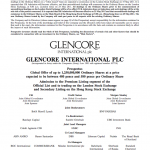Stabilisation profits: sharing is caring
I turn my attention to one of the ECM world’s best-guarded secrets: the profits banks can make from stabilisation.
I turn my attention to one of the ECM world’s best-guarded secrets: the profits banks can make from stabilisation.
Or so the saying goes. Not in China, it seems. read
Having left investment banking a while ago, I’m baffled by the increasingly arcane and complex rules that now plague the business — the Chinese Mainland being a particular case in point. read
I now write “Clawback” for GlobalCapital (formerly known as EuroWeek), a new column dissecting topics in Asia’s equity capital markets. read
One of the perks of working in an investment bank is – or rather was – a fairly casual approach to expenses. Virtually everything is billable back to the employer, who directly or indirectly passes the expenses onto clients. read
HONG KONG (Dow Jones Investment Banker) – Underwriters persistently rake in higher IPO fees in the US than in other markets. But with foreign companies increasingly shunning US listings, the American premium may be hard to sustain.
HONG KONG (Dow Jones Investment Banker) – With market volatility comes caution, and IPO syndicates are no exception. Internationally and in Asia, these are increasingly becoming crowded at the senior end for sizeable transactions in particular. Junior underwriters, whose contribution remains marginal, are being squeezed out. read
Revenue generated by investment banks from underwriting Chinese IPOs globally was US$650 million in the first three months of this year, The Wall Street Journal reported. With all due respect to the Journal, that is probably a low-ball estimate, not counting all the ways banks profit from new listings. read

The total number of shares subscribed for by cornerstone investors in Glencore’s IPO, which is targeting proceeds of about US$10 billion (excluding a 10% over-allotment option), is expected to represent approximately 31% of the global offer, assuming the overallotment option is not exercised. The US$3.1 billion tranche therefore represents one of the largest cornerstone books by value ever achieved for an IPO. But there are consequences to the practice, which could come back and haunt the issuer as well as other investors in the company. read